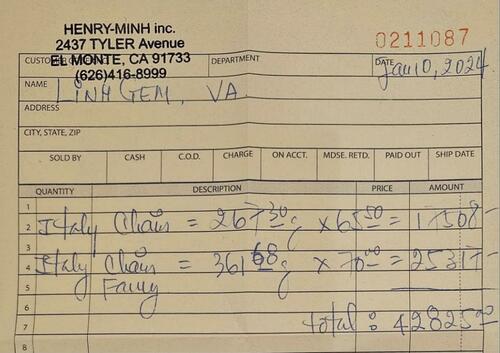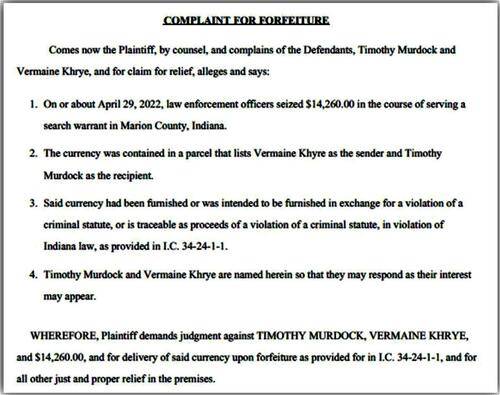Via Brian McGlinchey at Stark Realities
From a federal government operating far beyond the bounds of the Constitution to law enforcement agencies routinely entering private property without warrants, tyranny takes many forms in the United States. However, few are as shocking to the sensibilities as civil asset forfeiture, the controversial practice that empowers police to seize money, cars, trucks, houses or anything else they merely accuse of having a link to criminal activity — regardless of whether the property owner is charged with a crime.
Civil asset forfeiture is an affront to anyone who’s sincerely committed to the American justice system’s cornerstone presumption of innocence. With law enforcement typically keeping some or all of the assets that are seized, the practice has rightly been called “policing for profit.”
I’ve previously examined the raw tyranny of civil asset forfeiture, spotlighting the story of a Mississippi man who took $42,300 in cash to Houston with the intent of buying a second semi truck for his fledgling trucking business, only to have it seized — or, in legal jargon, “forfeited” — by Harris County police, who pulled him over for allegedly following the vehicle in front of him too closely.
Now I’m compelled to share a new example of this legalized theft — the most brazenly unjust and opportunistic one I’ve encountered yet: In an ongoing, multi-million-dollar racket in Indianapolis, police are routinely seizing cash they find in FedEx packages that happen to be routed through that company’s second-largest hub.
Like bears wading into a river teeming with salmon, state and local Indiana police officers routinely stride up to the conveyer belts at FedEx’s sprawling Indianapolis facility, where tens of thousands of packages flow by every hour, pouncing when they see a package with traits that meet their absurdly broad definition of “suspicious.”

Review the criteria and you’ll quickly conclude you’ve sent and received many “suspicious” packages yourself. Supposedly damning attributes include:
-
A box that’s taped on all its seams — something FedEx itself recommends
-
A box that’s new
-
A package that was dropped off at a FedEx shipping center
-
A shipment paid by credit card, or “possibly by cash,” or by “unknown means” — a trio of criteria that seems to cover every possible means of payment.
-
A package being sent to or from a so-called “source state” — a state that police consider a prominent conduit of illegal drugs. Depending on the law enforcement agency, that could encompass, among others, California, Oregon, Washington, Colorado, Arizona, New Mexico and Texas. That sample list alone accounts for 29% of the US population.
After plucking a package from the FedEx stream, police present it to a K-9. If the dog alerts — which dogs have been found to do unjustifiably up to 66% or more of the time — police obtain a warrant to open it. While they often find no drugs, they’re all too happy when they find cash, which is confiscated and held as prosecutors file suit for the government to take permanent ownership.
In April of this year, Henry and Minh Cheng, who run a mom-and-pop jewelry wholesaling business in Los Angeles, were caught in Indiana’s unconscionable web, as police confiscated $42,825 in a FedEx package en route to them from a retailer in Virginia. The retailer had been slow to pay for jewelry the Chengs had shipped to them in January. When the Chengs followed up on the invoice, the retailer offered to pay immediately via cash. In a fateful move, the Chengs obtained a FedEx shipping label and transmitted it to the Virginia retailer.

"The next thing I know is the police and the prosecutor [are] forfeiting my money…based solely on suspicions,” Henry Cheng told Los Angeles station ABC7. “They didn't even name the crime that I've committed, because I know I have not committed any crime.”
Consistent with the inherent madness of civil asset forfeiture — in which property itself is put on trial — asset forfeiture cases are given bizarre case names such as “Nebraska v. One 1970 2-Door Sedan Rambler (Gremlin).” The case in which Indiana seeks ownership of the Chengs’ seized cash is “State of Indiana v. $42,825.00 in US Currency.”
It’s bad enough when Indiana police seize cash out of a car they pull over for speeding somewhere in the state, baselessly assuming the money played some unknown role in the violation of Indiana law. However, in their exploitation of the FedEx facility, Indiana police are typically taking cash that’s only in Indiana because FedEx’s logistical algorithms routed it there rather than through another FedEx hub.
(When asked by Stark Realities if the police presence at the facility requires FedEx’s consent, the company declined comment. FedEx likewise chose not to say if it was concerned about customers’ property being seized by police without any specific allegation of a crime.)
The Marion County Prosecutor’s Office has sued to confiscate currency in FedEx packages traveling to and from states other than Indiana at least 130 times in just the past two years, never identifying any specific violation of Indiana law that’s the basis for the asset forfeiture. The prosecutor’s complaint typically only alleges that “the seized currency was furnished or was intended to be furnished in exchange for a violation of a criminal statute, or is traceable as proceeds of a violation of a criminal statute, in violation of Indiana law” — which is utterly implausible given the money was merely being shipped through the state, and not at the direction of the shipper or receiver.

Civil asset forfeiture places a daunting burden on those are victimized by it, forcing them to spend time and money navigating the government’s house of mirrors in an attempt to prove their money or property wasn’t associated with a crime. In many cases, victims of this legalized theft find the situation hopelessly complex and expensive, and simply give up. That demoralizing dynamic is compounded where the Indianapolis FedEx hub is concerned, as victims often live several hundred or even thousands of miles away.
Fortunately for the Chengs and hundreds of other victims of Indiana’s FedEx trap, their plight is now the focus of a class action lawsuit filed on their behalf by the Institute for Justice — a non-profit, public interest law firm that’s represented civil asset forfeiture victims across the country. Among other wrongs, the suit asserts that the police seizures of FedEx packages violate the US Constitution’s guarantees of due process, and the Indiana Constitution’s prohibition against prosecuting alleged crimes that occur outside Indiana.
"This scheme is one of the most predatory we have seen, and it's past time to put a stop to it," said Institute for Justice attorney Sam Gedge when the suit was filed. "It's illegal and unconstitutional for Indiana to forfeit in-transit money whose only connection to Indiana is the happenstance of FedEx's shipping practices."
Perhaps seeking to thwart the class action suit, the Marion County prosecutor’s office last week said it would give the lead plaintiff Chengs their money back — some seven months after taking it without articulating any specific violation of Indiana law. The suit will proceed, however, with Institute for Justice lawyers asking the court to bar the state of Indiana and Marion County prosecutor Ryan Mears from initiating currency forfeitures like the one that targeted the Chengs.
Reflecting on what police have done to him and continue doing to people across the country, Henry Cheng’s sentiments echo those of many Americans upon first learning about civil asset forfeiture: “I am just totally stunned that this can happen in America."
* * *
Stark Realities undermines official narratives, demolishes conventional wisdom and exposes fundamental myths across the political spectrum. Read more and subscribe at starkrealities.substack.com
Views expressed in this article are opinions of the author and do not necessarily reflect the views of ZeroHedge.
You may also like:
Via Brian McGlinchey at Stark Realities
From a federal government operating far beyond the bounds of the Constitution to law enforcement agencies routinely entering private property without warrants, tyranny takes many forms in the United States. However, few are as shocking to the sensibilities as civil asset forfeiture, the controversial practice that empowers police to seize money, cars, trucks, houses or anything else they merely accuse of having a link to criminal activity — regardless of whether the property owner is charged with a crime.
Civil asset forfeiture is an affront to anyone who’s sincerely committed to the American justice system’s cornerstone presumption of innocence. With law enforcement typically keeping some or all of the assets that are seized, the practice has rightly been called “policing for profit.”
I’ve previously examined the raw tyranny of civil asset forfeiture, spotlighting the story of a Mississippi man who took $42,300 in cash to Houston with the intent of buying a second semi truck for his fledgling trucking business, only to have it seized — or, in legal jargon, “forfeited” — by Harris County police, who pulled him over for allegedly following the vehicle in front of him too closely.
Now I’m compelled to share a new example of this legalized theft — the most brazenly unjust and opportunistic one I’ve encountered yet: In an ongoing, multi-million-dollar racket in Indianapolis, police are routinely seizing cash they find in FedEx packages that happen to be routed through that company’s second-largest hub.
Like bears wading into a river teeming with salmon, state and local Indiana police officers routinely stride up to the conveyer belts at FedEx’s sprawling Indianapolis facility, where tens of thousands of packages flow by every hour, pouncing when they see a package with traits that meet their absurdly broad definition of “suspicious.”

Review the criteria and you’ll quickly conclude you’ve sent and received many “suspicious” packages yourself. Supposedly damning attributes include:
-
A box that’s taped on all its seams — something FedEx itself recommends
-
A box that’s new
-
A package that was dropped off at a FedEx shipping center
-
A shipment paid by credit card, or “possibly by cash,” or by “unknown means” — a trio of criteria that seems to cover every possible means of payment.
-
A package being sent to or from a so-called “source state” — a state that police consider a prominent conduit of illegal drugs. Depending on the law enforcement agency, that could encompass, among others, California, Oregon, Washington, Colorado, Arizona, New Mexico and Texas. That sample list alone accounts for 29% of the US population.
After plucking a package from the FedEx stream, police present it to a K-9. If the dog alerts — which dogs have been found to do unjustifiably up to 66% or more of the time — police obtain a warrant to open it. While they often find no drugs, they’re all too happy when they find cash, which is confiscated and held as prosecutors file suit for the government to take permanent ownership.
In April of this year, Henry and Minh Cheng, who run a mom-and-pop jewelry wholesaling business in Los Angeles, were caught in Indiana’s unconscionable web, as police confiscated $42,825 in a FedEx package en route to them from a retailer in Virginia. The retailer had been slow to pay for jewelry the Chengs had shipped to them in January. When the Chengs followed up on the invoice, the retailer offered to pay immediately via cash. In a fateful move, the Chengs obtained a FedEx shipping label and transmitted it to the Virginia retailer.

"The next thing I know is the police and the prosecutor [are] forfeiting my money…based solely on suspicions,” Henry Cheng told Los Angeles station ABC7. “They didn't even name the crime that I've committed, because I know I have not committed any crime.”
Consistent with the inherent madness of civil asset forfeiture — in which property itself is put on trial — asset forfeiture cases are given bizarre case names such as “Nebraska v. One 1970 2-Door Sedan Rambler (Gremlin).” The case in which Indiana seeks ownership of the Chengs’ seized cash is “State of Indiana v. $42,825.00 in US Currency.”
It’s bad enough when Indiana police seize cash out of a car they pull over for speeding somewhere in the state, baselessly assuming the money played some unknown role in the violation of Indiana law. However, in their exploitation of the FedEx facility, Indiana police are typically taking cash that’s only in Indiana because FedEx’s logistical algorithms routed it there rather than through another FedEx hub.
(When asked by Stark Realities if the police presence at the facility requires FedEx’s consent, the company declined comment. FedEx likewise chose not to say if it was concerned about customers’ property being seized by police without any specific allegation of a crime.)
The Marion County Prosecutor’s Office has sued to confiscate currency in FedEx packages traveling to and from states other than Indiana at least 130 times in just the past two years, never identifying any specific violation of Indiana law that’s the basis for the asset forfeiture. The prosecutor’s complaint typically only alleges that “the seized currency was furnished or was intended to be furnished in exchange for a violation of a criminal statute, or is traceable as proceeds of a violation of a criminal statute, in violation of Indiana law” — which is utterly implausible given the money was merely being shipped through the state, and not at the direction of the shipper or receiver.

Civil asset forfeiture places a daunting burden on those are victimized by it, forcing them to spend time and money navigating the government’s house of mirrors in an attempt to prove their money or property wasn’t associated with a crime. In many cases, victims of this legalized theft find the situation hopelessly complex and expensive, and simply give up. That demoralizing dynamic is compounded where the Indianapolis FedEx hub is concerned, as victims often live several hundred or even thousands of miles away.
Fortunately for the Chengs and hundreds of other victims of Indiana’s FedEx trap, their plight is now the focus of a class action lawsuit filed on their behalf by the Institute for Justice — a non-profit, public interest law firm that’s represented civil asset forfeiture victims across the country. Among other wrongs, the suit asserts that the police seizures of FedEx packages violate the US Constitution’s guarantees of due process, and the Indiana Constitution’s prohibition against prosecuting alleged crimes that occur outside Indiana.
"This scheme is one of the most predatory we have seen, and it's past time to put a stop to it," said Institute for Justice attorney Sam Gedge when the suit was filed. "It's illegal and unconstitutional for Indiana to forfeit in-transit money whose only connection to Indiana is the happenstance of FedEx's shipping practices."
Perhaps seeking to thwart the class action suit, the Marion County prosecutor’s office last week said it would give the lead plaintiff Chengs their money back — some seven months after taking it without articulating any specific violation of Indiana law. The suit will proceed, however, with Institute for Justice lawyers asking the court to bar the state of Indiana and Marion County prosecutor Ryan Mears from initiating currency forfeitures like the one that targeted the Chengs.
Reflecting on what police have done to him and continue doing to people across the country, Henry Cheng’s sentiments echo those of many Americans upon first learning about civil asset forfeiture: “I am just totally stunned that this can happen in America."
* * *
Stark Realities undermines official narratives, demolishes conventional wisdom and exposes fundamental myths across the political spectrum. Read more and subscribe at starkrealities.substack.com
Views expressed in this article are opinions of the author and do not necessarily reflect the views of ZeroHedge.
You may also like:

